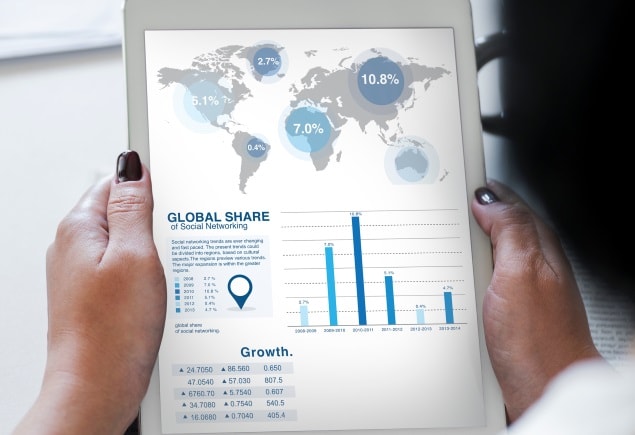Second, testing companies put together their reference populations
其次,测试公司的参考人群都是通过
based on academic research and other people that have taken genetic ancestry tests.
学术研究的受试者和做基因检测的其他用户拼凑起来的。
And most testing companies aren’t clear about how many people are represented in their reference populations.
而且,大多数检测公司自己都不清楚他们的参考人群有多少人。
So each company might have different reference databases,
所以,各家公司的参考数据库可能会不一样,
which helps explain why you might get different results from different companies.
这也帮助解释了为什么不同的公司给出的检测结果之间会有差异。
So what does this all mean for my results?
问题是,说了这么多,跟我的检测结果有什么关系呢?
This is a probability with a margin of error.
这是一个存在误差范围的概率问题。
So it's not that you overall are eighty-five percent West Asian,
也就是说,并不是说你的整个基因里有85%的西亚人基因,
but that the particular spot that they happened to look at,
而是他们碰巧考察到的那个地方的
eighty-five percent of those locations are associated with Western Asia in their reference population.
那些位置中有85%的位置都跟他们的对照基因库里的西亚基因有关。
So what about these other results? Am I really 2 percent African?
那报告中的其他结果呢?我真的有2%的非洲人基因吗?
You've got a lot of, you know, sort of small trace percentages here.
你的报告里有很多微量的百分比。
Percentages that small are really not meaningful,
那么小的百分比其实是没有意义的,
again because that could be affected by having one person in the database.
还是因为基因库里只要有一个人就会影响到这些比例的原因。
And if that one person gets reclassified later on, because they get a larger sample, that percentage will disappear.
如果因为样本的扩大,这个人后来被重新进行划分了,那这个百分比就会消失。
Ultimately, DNA ancestry tests are really just giving us a probability, the testing company’s best guess.
归根结底,基因检测只是给了我们一个概率,一个检测公司能给出的最为可能的猜测结果。
And that uncertainty isn’t made very clear in the results.
但检测报告并没有清楚地说明这种不确定性。
Buried in my results I found this “confidence slider.”
我发现,我的检测结果还夹杂了这个“置信度滑块”。
It turns out, my results were presented at about 50% confidence by default.
默认情况下,我的结果显示的置信度为50%。
When I increased it to 90%, my results got much more vague.
当我把它滑到90%的时候,我的结果就变得模糊得多了。
All of a sudden I was "broadly" West Asian and a lot of my genetic markers were unassigned.
我突然又变成“基本上”是西亚人了,还有很多标记基因完全没有匹配。
So, DNA ancestry tests don’t actually tell us where our ancestors lived -
所以,基因检测并不能告诉我们我们的祖先是哪里人,
they're really just giving us probabilities of where we’re likely to have relatives today.
只能给我们一些今天哪些地方可能会有我们的亲戚的概率。
But so what if people misinterpret their results?
但如果人们对他们的检测结果理解有误会怎么样呢?
Well that has consequences.
嗯……是会有后果的。

They can make us believe that our ethnicities have these bright-line distinctions between them, like in a pie chart.
这种误解会让我们相信,我们的种族之间是存在泾渭分明的区别的,就像饼状图里的各个分块一样。
When people are presented with test results and these percentage breakdowns
当人们看到这种检测结果和这些分解后的百分比,
and they are led to think that these tests can tell you your race or they can tell you who you are,
他们就会认为,这些检测能够告诉你你的种族,告诉你你是谁,
that leads to a way of thinking — makes us feel that there are very stark and clear biological differences between races.
这就会促成这样一种思维方式,我们就会感觉种族之间有着非常明显的生物学差异。
One study found that DNA ancestry tests reinvigorate age-old beliefs in essential racial differences,
某研究发现,基因检测还让由来已久的那种认为种族之间存在本质差异,
that our socially constructed racial categories like “white” or “black” are essentially different from each other.
社会建构起来的种族类别,如“白人”或“黑人”,本质上彼此不同的观念。
Some groups have even turned to genetic ancestry tests to try and prove their "racial purity."
一些群体甚至试图靠基因检测来证明他们的“种族纯洁性”。
DNA ancestry tests can be useful.
尽管如此,基因检测还是很有用的。
Search YouTube and you'll find hundreds of stories of people using them to find lost relatives and fill in their family histories.
在YouTube上搜索,你会发现数百个有关人们用这种技术寻找失散的亲人,填补家族历史的故事。
I just found my biological dad's family.
我刚刚找到了我亲生父亲的家人。
And, to people who don’t know a lot about their ancestry, the tests offer the best available estimate.
而且,对于那些不太了解自己祖先的人来说,这些检测也提供了最大程度的猜测结果。
So I really don't know that much about my genetic history...
我其实并不太了解我的基因历史…
But it’s important to remember that, despite their marketing,
但重要的是要记住,尽管这类检测产品正在被各种营销,
these tests are just a company’s best guess at matching your genetic markers to different parts of the world.
它们也只是一个公司将你的基因标记与世界不同地区的样本进行匹配时的最佳猜测而已。
What they’re not going to tell you is whether you should wear a kilt or not.
这些测试并不会告诉你是否应该穿短裙。
DNA ancestry tests might not be as informative as you want them to be,
基因检测可能没有你想像的那么有用,
but more and more people are still taking them.
但做基因检测的人还是在不断地增加。
And this giant database of genetic information is becoming super valuable to an unexpected group: Law enforcement.
所以,这个巨大的基因信息数据库对某个群体——执法部门——来说正变得超级有价值,这倒是挺让人意外的。
We’ve teamed up with Verge Science, to look into how your privacy is at risk because of genetic ancestry tests, even if you’ve never taken one.
本栏目已经和《边缘科学》(Verge Science)栏目谈了合作,考察你明明没有做过基因检测,基因检测为何还是可能威胁到你的隐私这一问题。


